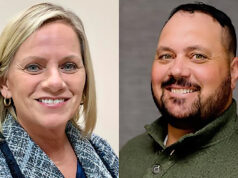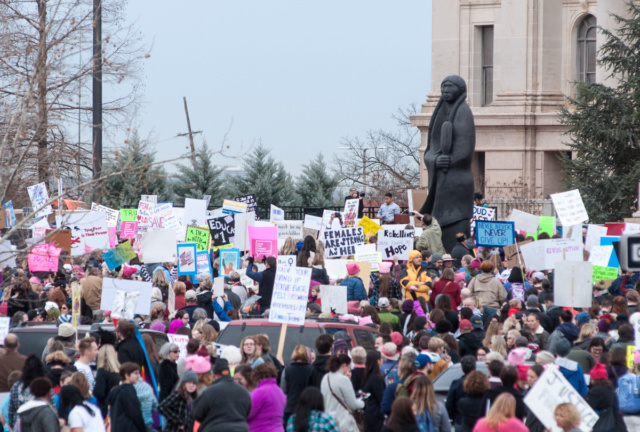

As I squeezed through the thousands of people gathered this morning for the Women’s March at the Oklahoma State Capitol, I tried to be respectful by repeating an old apology: “Pardon me. Working press coming through.”
One woman responded more directly than most.
“You working press guys, we expect a lot of you in the next four years,” said Melissa Rabe of Cole, Oklahoma. “It’s going to be required if we’re going to keep our democracy.”
During the two hours I spent interviewing attendees, that concern for the future of American democracy crept out of the mouths of numerous women who were simultaneously frustrated, angry, scared and motivated by Friday’s inauguration of President Donald Trump.
“He has a 1950s attitude toward women,” said Becky Tallent, an OKC resident who attended with fellow members of the First Unitarian Church. “In his world, the No. 1 objective for a woman is to bear his children.”
Tallent and her cohorts — including Vicki Williams of Watonga — were gathered 50 yards from an assembled stage in front of the Oklahoma Capitol’s blockaded front steps. The crowd occasionally hooted, hollered and woo’d in front of us, but the sound system for the event was proving insufficient.
“We can’t hear anything,” Williams said. Tallent agreed: “I’m disappointed.” Williams replied: “But it’s not a deal breaker.”
Indeed, the gathered crowd was large enough to inspire hope in all of the women to whom I spoke, even though most struggled to hear the day’s speakers. At high noon, tornado sirens drowned out the podium-holders even further, but the crowd erupted into joyous screams anyway.
“We are here in Oklahoma, and we are standing up for what is right,” Williams said. “Don’t forget about us in Oklahoma.”
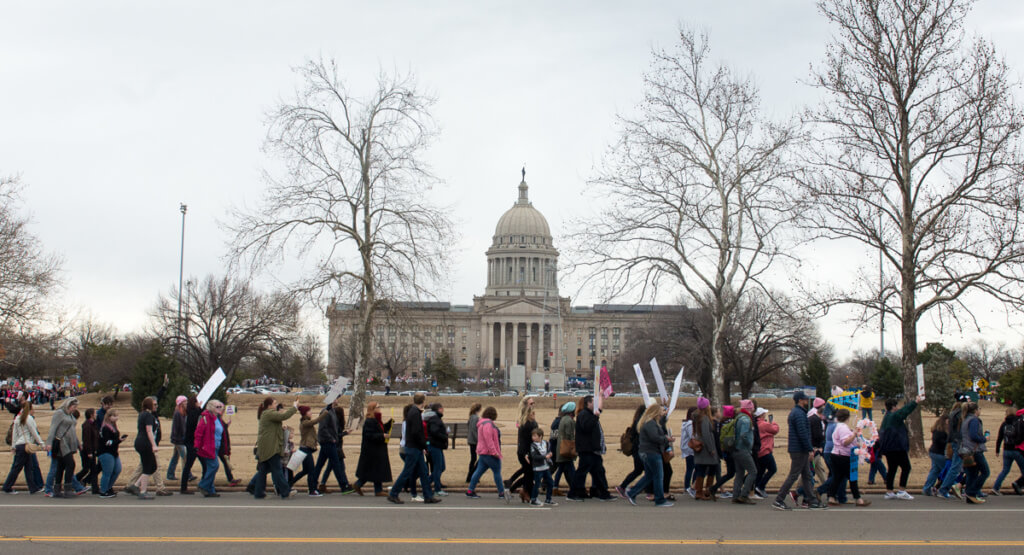
Interrupted by a man
Sarah Baker, executive director of the Oklahoma Democratic Party, praised Saturday’s turnout and highlighted the stress many women — and men — have felt since Trump defeated Hillary Clinton on Election Day.
“I think this is part of the healing process,” Baker said. “But what will be truly telling is, coming away from events like these, what this will translate to on a daily basis — registering voters; supporting candidates; getting off of Facebook and Twitter and truly engaging.”
Anyone who has ever worked in politics can likely understand Baker’s perspective. Rallies are fun, signs can be humorous and mutually distraught people can find strength in numbers. But if anyone or any group hopes to see their political opponents stopped — or their political goals realized — the hard work of creating change doesn’t happen at a fleeting Saturday morning rally.
“I saw what happened with the education rallies when 20,000 people showed up and the Legislature ignored them,” Baker said. “If all we do is make signs and get up on a Saturday morning, but we go home and watch television and argue on Facebook, then nothing changes.”
Suddenly, Baker and I were interrupted by Oklahoma Democratic Party Chairman Mark Hammons, who wanted her to take a photograph at their voter registration table. She obliged, he realized he needed to apologize, and eventually we continued talking.
“There’s a huge percentage of people here under the age of 45, but only about 19 percent of Oklahoma’s population under 45 actually participates in the democratic process,” Baker said.
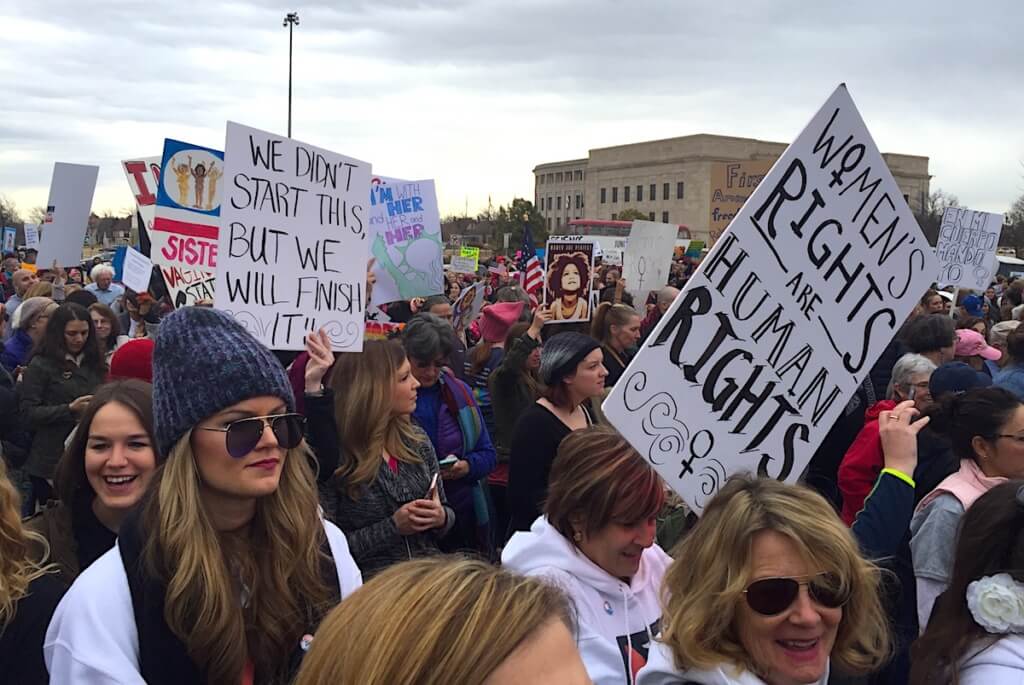
‘It pisses me off’
To that end, Saturday’s event offered a chance for the politically active to engage with average citizens who are worried about the yet-to-be-determined future of Trump’s America.
Gracie Barry, Lucie Bradshaw and Carly Guillot each had that worry. The three friends shared their experiences as young women grappling with their fears of the next four years while the crowd set off on its big march — a three-block loop down Lincoln Boulevard to N.E. 19th Street and back.
“I’m displeased with the results of our presidential election, so I figure this is the only way to use our voice right now,” said Barry, who was attending her first rally at the Capitol. “[Trump] is a misogynist, a racist, and I don’t think he’s protecting any of the people.
“And he’s the leader of the free world. I think that’s terrifying. As citizens of this country to not feel protected by our leader, if you don’t feel he’s fighting for you, I don’t really feel like a part of this country.”
Bradshaw, a Tulsa native who lives in OKC, noted that those feelings may be new for a lot of people like herself.
“I think I’ve been really privileged because I’m a white woman,” Bradshaw said. “So I think this is one of the first times I’ve actually felt threatened. And I want to stand for others who have led their whole lives in America feeling this fear.”
Guillot is an Oklahoma native like her friends, but she lives in Austin and had flown to OKC for the weekend to attend the rally with her mother and aunt.
“Devastated,” she said when asked how she felt about Clinton’s loss to Trump on Election Day. “I think it came down to the fact that she was a woman. Even women will never admit that, but even women didn’t vote for her. Beyond the emails and all of that stuff, I think it came down to people not being ready for a woman to run the country. They don’t see women as the same as men, and it pisses me off.”
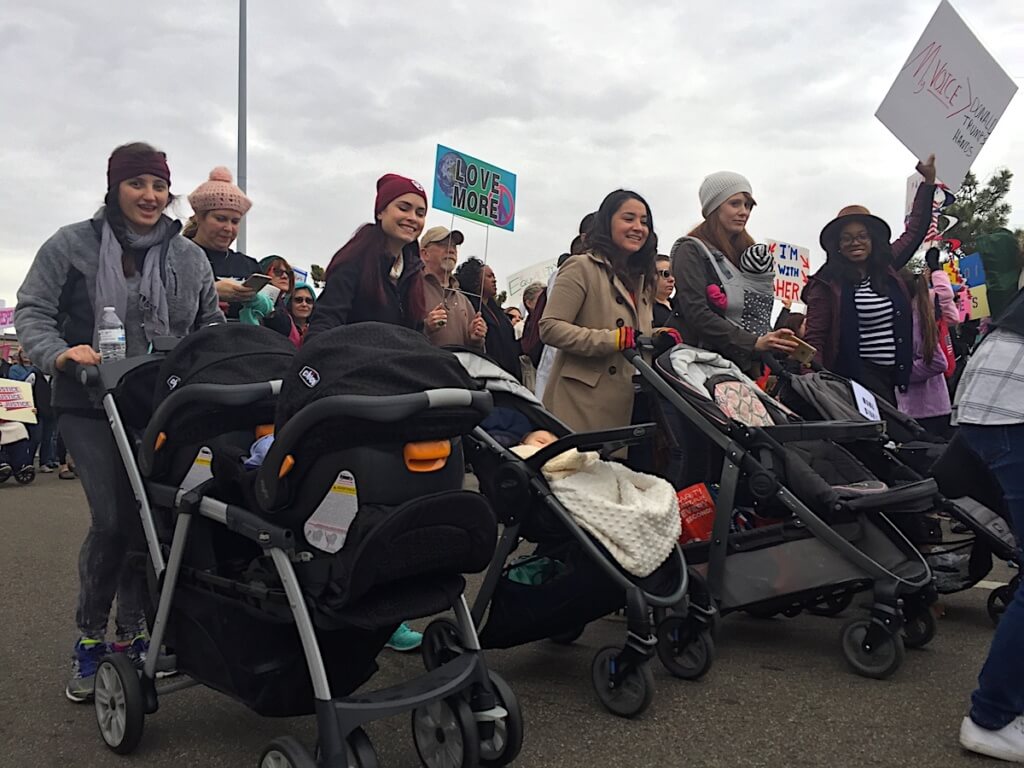
Take a load off, Toni
Asked what concerned her the most, Guillot’s mother, Toni Osterhout, emphasized her fear for American democracy and what Trump’s occasionally authoritarian rhetoric may mean for her daughter and future generations.
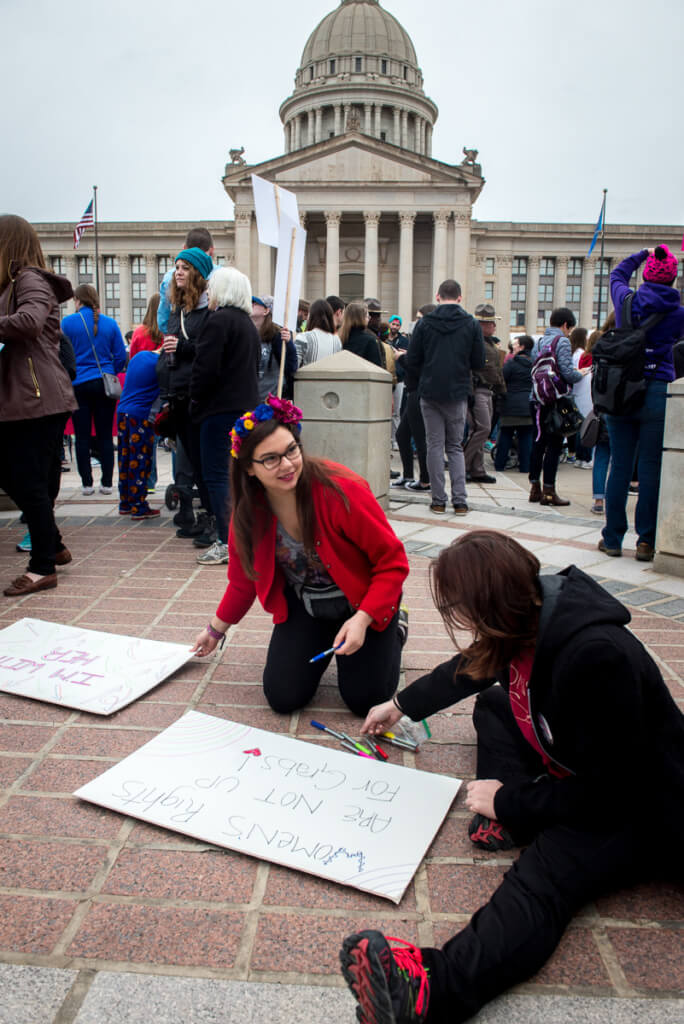
“It stuns me,” she said. “I’m astounded that there are so many people I know who would be supporters of that type of person.”
Guillot had also made vague reference to Trump as a certain type of person, and I asked her to elaborate.
“Horrible,” she said. “Deplorable. Despicable. Just everything that everybody knows he is.”
Osterhout said that Trump stands in stark contrast to former President George W. Bush.
“I was unhappy with George Bush. I didn’t have a super-high opinion of him. But I could stand it,” Osterhout said. “He knew enough that he didn’t know everything, and he could surround himself with some people who did. This Trump is just a narcissist, man. He’s scary.”
She breathed a sigh of relief afterward and laughed.
“You got that off my back,” she said. “My back was hurting, but now I feel better.”
I told her that’s what talking to the press is good for — catharsis.
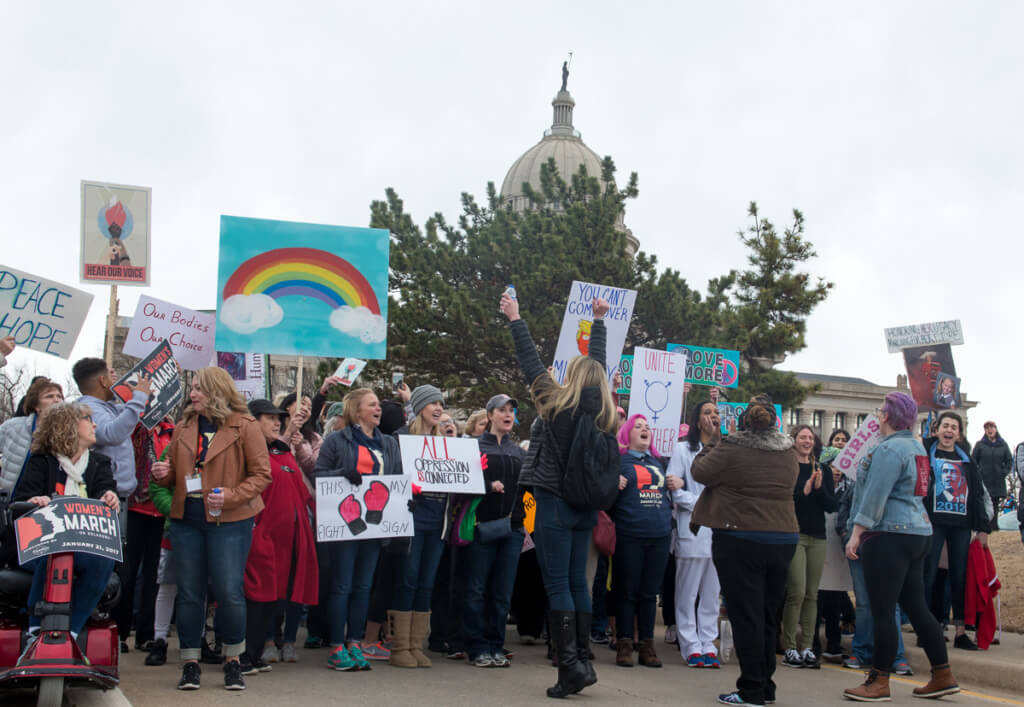
‘Not a diverse enough crowd’
As the rally attendees marched in their loop, I cut through the streams of people and tried to look at the crowd broadly. Various chants broke out, including “Fund education now!” and other phrases intended to support the LGBTQ community.
Largely, however, the crowd was white. Starkly white. A smattering of Native Americans milled about, some flying tribal flags, and if I looked closely, I could find a handful of African Americans marching, too. Imam Imad Enchassi was taking pictures.
But Hispanic attendance seemed nearly nonexistent, and the light turnout among black activists — considering the rally’s location, especially — caught the attention of several people I talked to.
Chandler Fann, a Stillwater resident, stood toward the back of Saturday’s crowd holding a sign saying, “Intersectionality or bust.” It caught my attention owing to a powerful commentary on the intersection of race and gender that we published last week from Candace Liger, who was also in attendance.
“I don’t think you can have feminism without intersectionality — without acknowledging that there are different challenges for different women,” said Fann, who is white. “In my mind, white women have kind of taken over feminism and made it about their issues without acknowledging that black women or any minority women face additional issues.”
Fann pointed to police brutality and unequal pay as issues of extra obfuscation for minority women.
“They’re even less likely to get a job interview (than a white woman),” Fann said. “I think it’s time that white women need to take on a cause bigger than our own.”
While Fann said she actually expected Saturday’s rally to be more white than it was, others noticed what I had as well.
“We’ve got to do a better job of reaching out to minorities,” said former gubernatorial candidate Joe Dorman. “This is a great and wonderful crowd, but it’s not a diverse enough crowd.”
As I jotted down Dorman’s quote, I walked toward Angel Eakers, a black woman who had been taking pictures and video with her phone. I asked whether her glass was half empty or half full in terms of the event’s racial makeup. Was she shocked to be in such the minority, or was she happy to see so many white people marching against Trump?
She chose the latter.
“It’s awesome because, when you know that people are voting for someone who views you as somehow less than human, that’s scary,” Eakers said. “I see this as a wake-up call. I’m encouraging my daughter to run for office now — to be more active and not to be on the sidelines.”
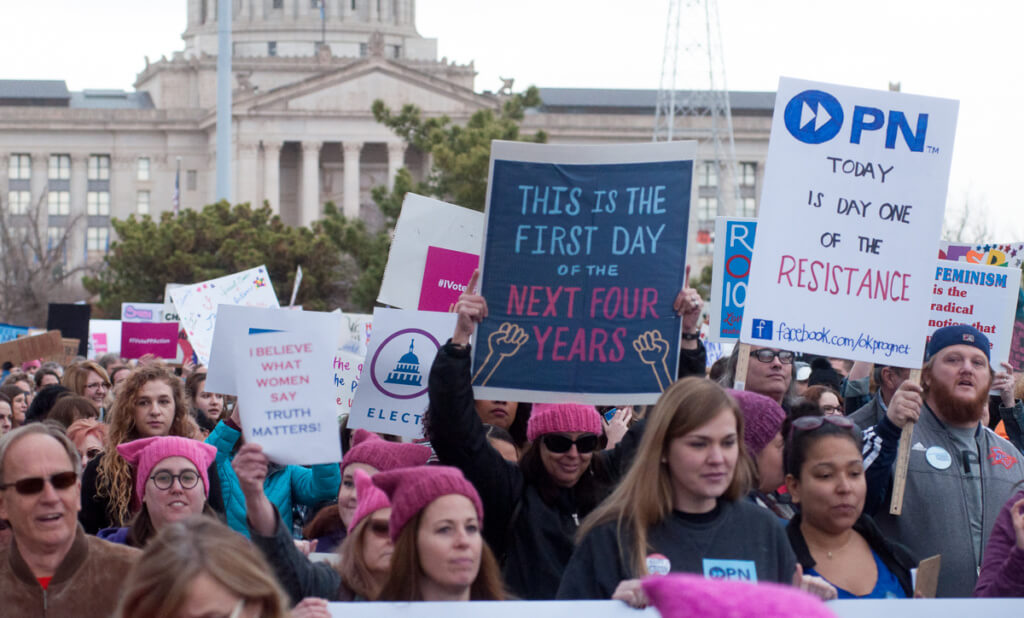
‘Women who can do more’
Eakers has two daughters and a son, and as we stood feet away from Oklahoma City police officers, she explained how Trump’s racial and gender rhetoric exacerbates the fear she already has for her children, especially her daughters.
“I want them to be seen as whole women and not to be marginalized,” Eakers said. “I want them to be seen as women who are powerful, women who can do more and be more than society sees them as now.”
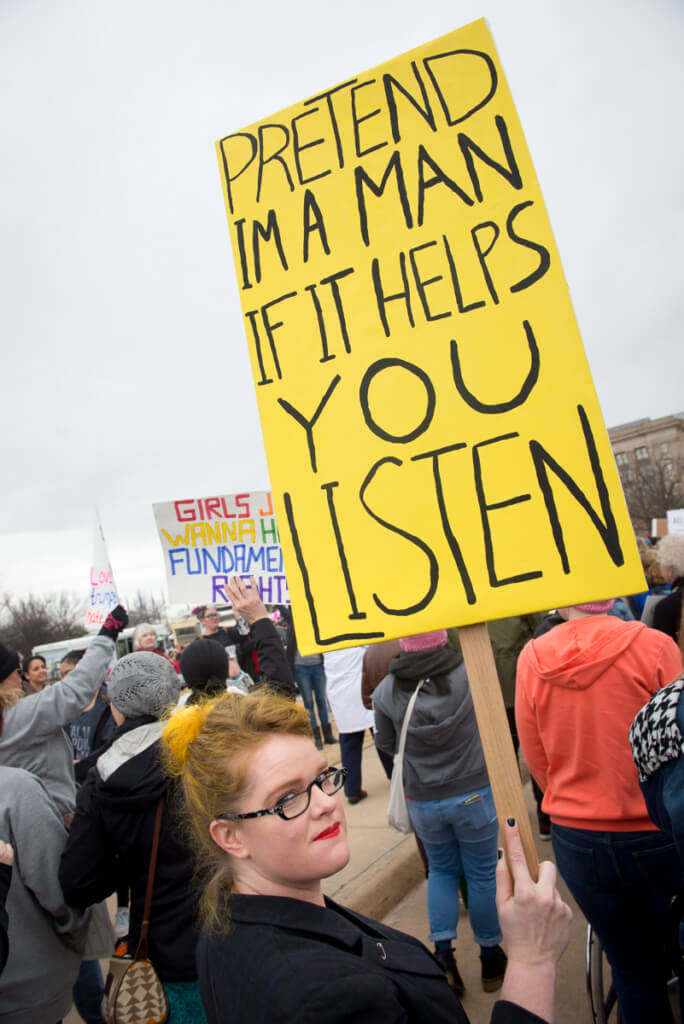
She touched on rape culture without doing so by name.
“If they go to a party and their dress is short, I don’t want that prevailing wind that you see now to say it’s OK to rape them because they wanted that particular action because of a dress they had on,” Eakers said. “You see people more OK with that bigoted talk, and that really scares me.”
Virtually any way you look at it, however, Friday’s inauguration of President Trump cannot be blamed for those attitudes. The marginalization of women as sex objects has been an issue for as long as anyone in attendance Saturday could remember.
Ironically, it happens in the Oklahoma Capitol all of the time, and anyone who hasn’t seen lecherous behavior from lawmakers on both sides of the aisle hasn’t spent enough time there as a journalist.
The public has received a tiny taste of it recently during the ongoing investigations of sexual harassment accusations against two members of the Oklahoma House: Rep. Dan Kirby (R-Tulsa) and Rep. Will Fourkiller (D-Tahlequah).
Earlier in the morning, I had pressed freshman Rep. Mickey Dollens (D-OKC) on that topic while he was telling me about the “struggle” that women and girls face in being treated equally.
“There’s no excuse for any type of harassment,” Dollens said in relation to the allegations against Kirby and Fourkiller. “What happened to common decency and treating people with respect?”
That’s a good question, representative.
If you find the answer, email it to the working press, please.
(Clarification: This post was updated at 9 p.m. Saturday, Jan. 21, to reflect more accurate statistics in Sarah Baker’s quote.)











